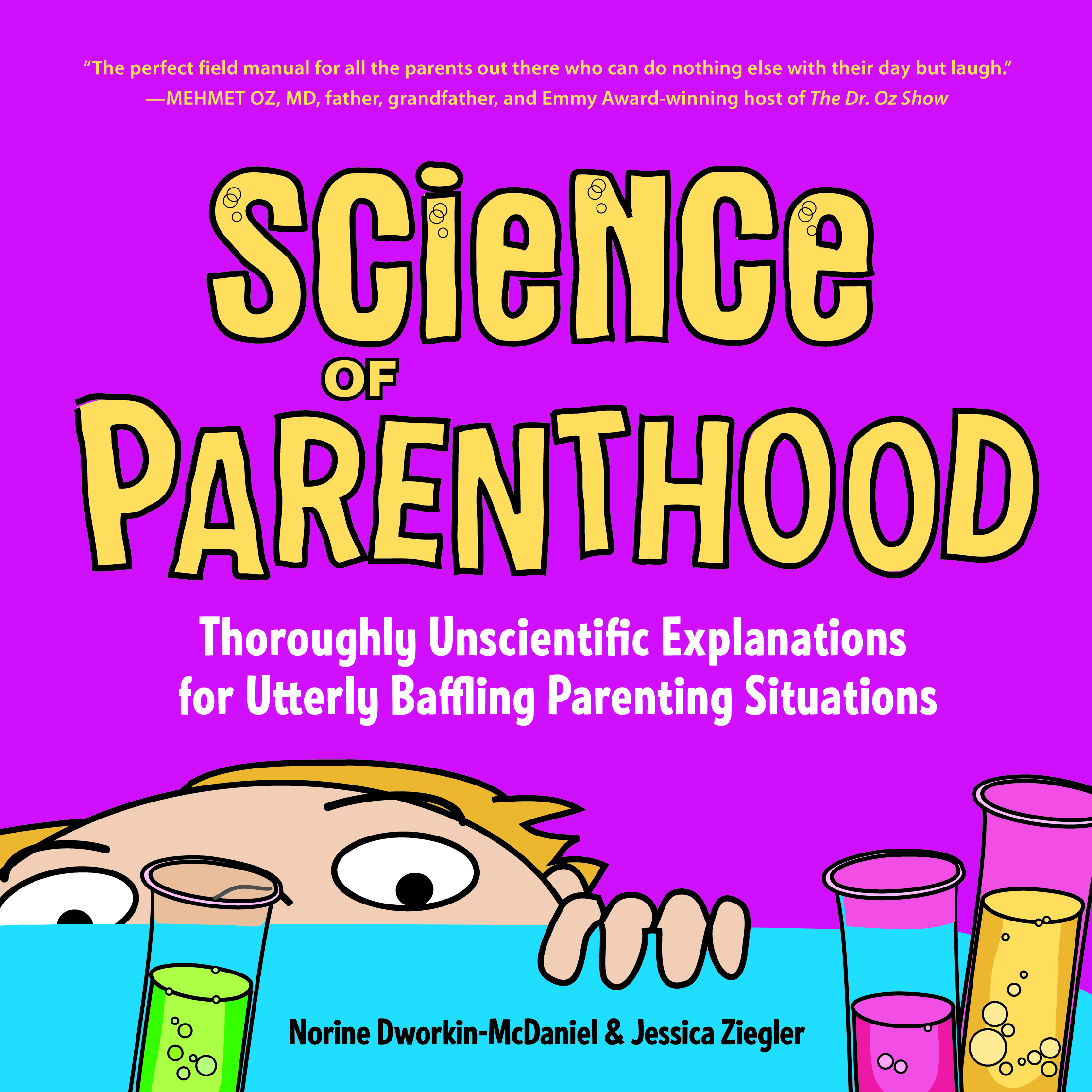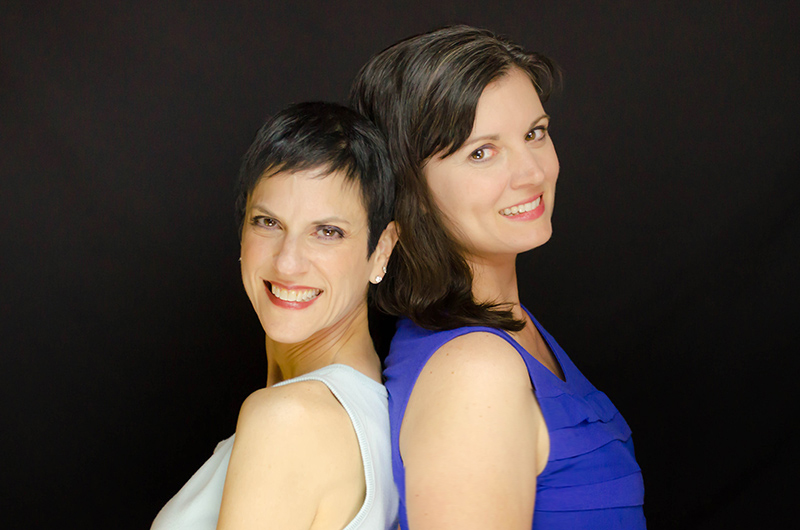A few years ago, at my first BlogHer conference, I met fellow blogger Norine Dworkin-McDaniel, who was funny, driven, and on a first name basis with practically every attendee. Norine, along with comrade-in-arms, Jessica Ziegler, had a plan, and that plan was to find the humor in parenting, from the silly to the “what the hell?” moments.
Norine and Jessica accomplished this goal through their successful blog, Science of Parenthood, which is described as “an illustrated parenting humor blog inspired by the madness of raising kids, which not even science can explain.” They’ve reached blogger nirvana now, with the publication of their new book, Science of Parenthood, which is filled with “Thoroughly Unscientific Explanations for Utterly Baffling Parenting Solutions” (that clever phrase is the book’s tagline). It’s hilarious—and totally true.
Norine and Jessica invited me to join their Blogger Tour, a celebration of their funny and a chance to review their book here on Red Shutters (which they sent to me as a thank you). Before I even read Science of Parenthood, I knew it was a success: my kids grabbed the book from my hands as I opened the package, exclaiming, “A new comic book? Cool!” They disappeared with it in hand, and I had to chase them down to get MY BOOK back. (Well done, ladies. Now if you could get them to respond the same way to their homework.)
 Science of Parenthood
Science of Parenthood is more than a comic book, of course. It’s that resource you need when you think you’re the only one struggling with parenting; Norine and Jessica show you many of our struggles are universal—and capable of making your funny bone dance.
Let’s hear about Science of Parenthood from Norine and Jessica themselves; here’s Q&A with the authors:
Q: What’s Science of Parenthood all about?
A: Science of Parenthood started nearly three years ago as an illustrated humor blog. We use fake math and science to “explain” the stuff that puzzles parents every day. Things like …
Why are broken cookies “ruined?”
Why does it matter what color the sippy cup is?
Why can’t you put the straw in the juice box without your kid having a melt down?
Why will a kid whine-whine-whine for a toy, then lose all interest in that toy once they have it?
Where the eff is my phone?
Our book, Science of Parenthood, is like our blog … but like our blog on STEROIDS! We utilized the blog to road test—perhaps we should say “field test”—material, and now the book contains the kinds of cartoons and writing that fans love to find at our blog, along with all new cartoons, infographics, flowcharts pie charts and quizzes that we created just for the book. About 90 percent of the book is brand new material.
Divided into four sections—biology, chemistry, physics and mathematics—the book lives in the chasm that exists between our collective hopes and dreams and expectations of what parenting will be like … and the brutal, slap-you-upside-the-head reality of what parenting actually is. We cover all aspects of pregnancy, birth and the hilarious frustrations that come with early childhood (tantrums, picky eating, diaper blowouts, illness, sleep issues, play dates, toy creep, homework battles and encounters with crazy parents (not you, of course, we mean other parents). And you know what? You don’t even need to be a scientist to “get” it.
Our goal is just to make parents laugh. Because when you’re a parent, you NEED to laugh. Humor is a survival tool. After your tot has gotten the top off a jar of Vaseline and smeared every surface within reach—as happened to our friend Gail—or tried to “help” you paint a room and ended up covered in blue paint—as happened to Norine’s sister Shari—you have to laugh. Or you’ll end up sobbing.
Q: Is any of the book autobiographical?
A: Pretty much all of the book reflects through our experiences as parents. Take the piece “Experimental Gastronomy: A Study in Potatoes” from the Chemistry section. It’s written like a scientific paper about an experiment in which a researcher tries to determine if a preschooler who likes French fries will eat mashed potatoes. Raise your hand if you can hypothesize the outcome (see what we did there?). The piece is completely based on Norine’s inability to get her five-year-old, who loves fries, to even taste mashed potatoes. Says Norine: “I tried everything! I even offered him extra chocolate for dessert, and he still refused to take even one tiny nibble.”
Q: Why science? Are either of you scientists?
A: Not at all. We’re moms dealing with the same kind of crazy stuff everyone else is. Science just makes a great metaphor for the frustration, exasperation and humiliation that comes with everyday parenting. Think about Einstein and how he explained his theory of relativity: “Sit on a hot stove for a minute and it seems like an hour; sit with a pretty girl with an hour and it feels like a minute. That’s relativity.” Well, that’s parenthood too. One minute you’ve got a newborn covered in goo and then next, you’re watching teary-eyed as they skip into kindergarten without even a backward glance or a kiss goodbye. And yet, when you’re into your third hour of Candy Land on a rainy day, time seems to stand still. (If you haven’t played Candy Land with your toddler yet, trust us on this. The scars never really heal.)
Q: Where did you get the idea for Science of Parenthood?
A: Our “eureka” moment came when Norine’s son, Fletcher, came home from school talking about one of Newton’s laws of force and motion: An object at rest stays at rest unless acted on by an external force.
Says Norine: “That instantly reminded me of Fletcher with his video games. He’d sit on the couch and play games all day if I didn’t confiscate the iPad. I jotted down, Newton’s First Law of Parenting: A child at rest will remain at rest until you want your iPad back. Later, I posted that on Facebook. It got a good response, so I started posting other parenting observations and giving them a math or science twist, like Sleep Geometry Theorem: A child will always sleep perpendicular to any adult laying next to them. Both of these are fan favorites and two of the very few cartoons we pulled from the blog to include in the book.
“As a writer, I’m always looking for new ways to tell stories. And in that eureka moment, it struck me that math and science make fantastic metaphors for telling the universal stories of parenting. Like scientists, we parents are always fumbling in the dark, searching for answers, wondering if we’re on the right track and second-guessing our methods. And because a picture is still worth a thousand words, I knew that these science-y quips would be a lot more popular on social media if they were illustrated. So I called Jessica and asked if she wanted to illustrate a book of these funny observations.
“Jessica was the one who saw that Science of Parenthood could be much bigger than a single book. She saw the potential for a blog and a social media presence and ancillary products. She quickly secured a domain name for us and created a Facebook page and Twitter feed. She began illustrating the observations I had already banked. Two weeks later, we debuted on Facebook; a week after that we rolled out the blog. Now we’re three years in, Science of Parenthood, the book, has been published.

The funny ladies behind Science of Parenthood: Norine and Jessica (Photo courtesy of Science of Parenthood; Photo credit – Gregory Casey)
You want to read Science of Parenthood now, don’t you? Go get it for yourself, a friend, or that neighbor down the street who could use a laugh. Maybe wait to give it to your friends who are thinking about having kids, though; hold off until they’re knocked up or the adoption papers are signed. After all, the prospect of hours of Candy Land (among other things) could turn them off for going the parenting route forever!
Science of Parenthood is available on Amazon and your local corner bookstore. Until you have the book in hand, check out Norine and Jessica’s wit on Facebook, Twitter, Pinterest, and Instagram.
Disclosure: I received a copy of the book for this review. All opinions in this post are mine. This post includes affiliate links; read my disclosure policy.
